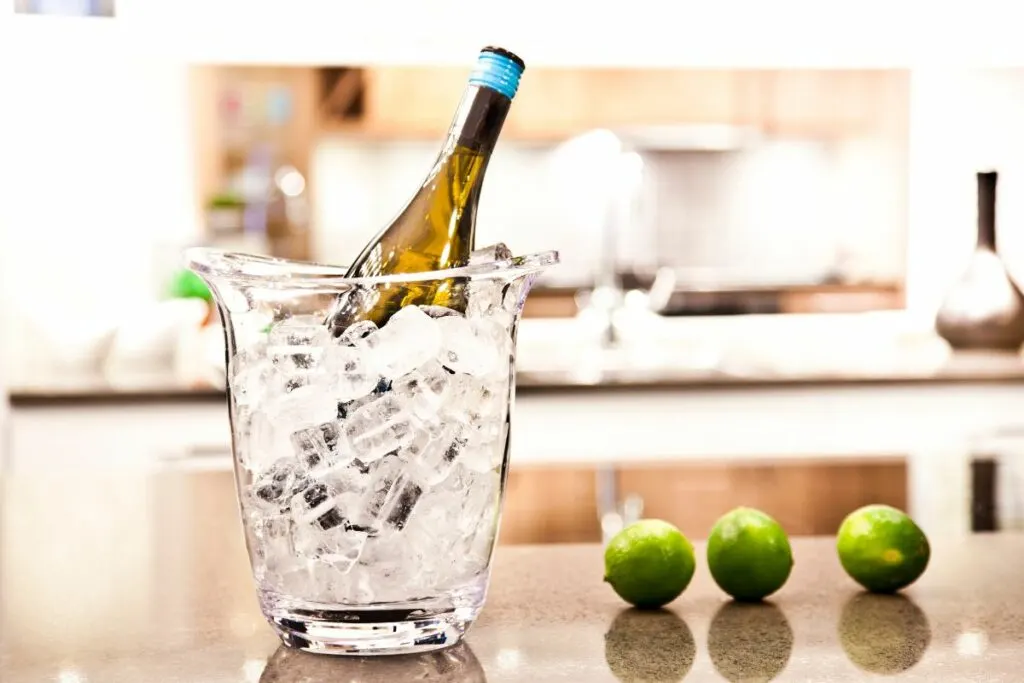As an Amazon Associate, I earn from qualifying purchases with no additional costs for you.
Drinking a glass of mineral or spring water with your wine is perfectly acceptable and normal; however, mixing water with wine is not common. A great bottle of wine took years to land on your table and is perfect, but let’s explain what happens when you put water in wine.
When you add water to wine, it becomes severely diluted. Adding a very small amount of water could enhance certain aspects of the flavors and aromas while diluting the alcohol content and structure. Water does not mix well with wine and lowers the quality.
Some enjoy drinking a white wine spritzer, and they make this by adding carbonated water to a dry white wine such as a Rhine Riesling, but that is entirely different from purely adding plain water to wine. Wine with ice-cold carbonated water can be refreshing, but let us see what happens if you put water in wine.

TIP: If you want to check out the best refrigerator for wine storage, I recommend trying out the Avation (18 bottles) compressor refrigerator with Wi-fi smart app control cooling system. You can find this refrigerator by clicking here (Amazon link).
Can You Put Water in Wine?
You can put water in wine, and there is nothing wrong with doing so. The ancient Greeks and Romans are known to have diluted wine to make it go further, especially at functions and weddings.
Adding water to wine when guests are already inebriated made the wine last longer and cost less.
The guests would not have tasted the diluted wine and still had a great time. However, adding water to wine and serving it to wine connoisseurs would undoubtedly be offensive. Unless the reason for adding water to wine is personal, there is no need to do it.
TIP: Do wine grapes contain alcohol? Find out here. Why does wine ferment in the bottle? Read about the key factors in this article.
What Happens if You Put Water in Wine?
Once you put water in wine, it primarily becomes diluted. It can slightly enhance certain aromas and flavors, but it is not like adding water to whiskey. When you add water to whiskey, the alcohol breathes, and the flavors are released.
The aromas and flavor profiles of a wine cling to the alcohol molecules. The higher ABV of wine is, the more closed the flavors and aromas are.
This will mean the alcohol will have a more prominent burn than a flavor. Adding water to wine can therefore liberate and enhance flavors. The gamble would be to know which wines will be ruined by adding water.
Here is a list of things that can happen when you add water to wine:
It Will Lower The Quality Of The Wine
- No evidence suggests adding water to wine improves the quality. On the contrary, it might very well diminish the original essence of the wine.
- Understandably, adding water to wine will dilute the ABV to a degree, but if that is the reason for adding water to wine, the better solution would be to halve the consumption.
- Some people might add water to boldly flavored wines, which takes away the flavor, aroma, and original complex taste.
The Structure Of The Wine Changes
- The art of winemaking has been in existence for several centuries. The techniques are passed down from generation to generation and improved as technology allows.
- Adding water to wine that has taken several years to perfect will change the delicate balance of the wine at bottling.
- The structure of the original recipe will be completely different, and the wine will not taste as it was intended.
TIP: Most wines go bad once you pop the cork within a day or so. But a Coravin Wine Preservation system (available for a great price on Amazon) can extend the life of your opened wine for weeks or even months. It is awesome. You should check it out to see if it fits your lifestyle.
The Wine And Water Don’t Mix At All
- According to an experiment where scientists took the purest water possible and mixed it with different wines, it was concluded that water and wine do not mix at all.
- The water and wine work against one another, so instead of adding water straight into the wine, rather drink water on the side in a separate glass.
- Adding water to wine is not a cure to prevent a hangover.
TIP: To learn how to store white wine after opening, check out this article. To discover if wine fridges are only for storing white wine, read this complete guide.
Recommendation box: Everything you need to enjoy your wine as much as possible. All recommended products are personally tested and regularly used by experts from this website (Amazon links):
> Ivation Wine Cooler – Energy-efficient wine cooler for 18 bottles with Wi-fi smart app control cooling system.
> Wine Rack – Beautiful, elegant wood rack for up to 7 bottles and the choice of vertical or horizontal storage.
> Durand Wine Opener – Classic vintage wine opener (we like all these classic staff).
> YouYah Iceberg Wine Decanter – The most beautiful and handy wine decanter we personally use.
> Bormioli Rocco Wine Glasses – A set of eight elegant and traditional wine glasses made in Italy.
> Vintorio Wine Aerator – Simple but really useful wine aerator for a reasonable price.
> The Original Vacu Vin Wine Saver – The best wine saver on the market in a package with two vacuum stoppers and two wine servers.
And if you want to become a true connoisseur of wine, we recommend reading the book Wine Folly: The Essential Guide to Wine (Amazon link), where you will find all the information you need about winemaking, wine varieties, flavors, and much more.
Does Adding Water to Wine Make It Weaker?

There are many accounts in ancient texts about diluting wine with water, and even in Homer’s Oddesy, there is a reference to this. The pages state that the correct ratio should be one part wine to twenty parts water, which seems excessive.
It can only be surmised that that dilution would be extremely weak and would not only destroy the wine structure, but it would taste nothing like wine. We have access to very pure and top-quality spring and mineral water, but the result will be the same even if the best quality water is added to the wine.
It is a common cultural practice that children are allowed to drink wine that is diluted with water in countries such as Spain, France, and Italy. This is allowed because the wine is weaker, and the ABV is much less and will, in theory, not get the children drunk.
When adding water to wine, the following observations can further confirm that it makes the wine weaker and tasteless:
- The alcohol burn on the nose disappears from even the highest ABV wine
- The aroma becomes heightened in high ABV wines when water is added
- More flavors can be heightened for a short period but then dissipates with time
- Any smokiness disappears
- The wine will be tasteless on the back of the palate.
The only time that adding water to wine makes sense is when it is used in conjunction with other ingredients. In particular, honey has been popular for centuries when mixed into wine with water, which produces mulled wine. This is how to create it:
- Decant the red wine into a carafe – this recipe is per 750ml bottle.
- Take care not to pour it out fast so that it doesn’t foam
- Measure off a ¾ cup of spring or mineral water with a neutral pH of 7 or the closest to neutral.
- Measure off a ¾ cup of raw, non-irradiated honey
- Half a teaspoon of black peppercorns
- 1 x cinnamon stick
- 5 Whole cardamom pods
- 3 Whole star anise
- Whole allspice
- Orange Zest – the orange brings it all together
TIP: If you are interested in buying a wine decanter, I recommend purchasing these two top-quality decanters:
- USBOQO Wine Decanter (check it out on Amazon & read customer reviews)
- Iceberg Wine Decanter (check it out on Amazon & read customer reviews)
The secret to the mulled wine is to heat it up slowly and keep it warm for a couple of hours before serving. This allows all the flavors and water to heat and adds a wonderful blend of spices to the red wine.
As far as adding water to wine goes, mulled wine is most probably the only tasty way to enjoy it.
TIP: To learn if a wine fridge can be safely kept on the carpet, please check out this helpful article. For a complete breakdown of how to store wine long-term in 8 simple steps, read this guide.
Conclusion
Unless a measure of water is being added to wine to avoid paying taxes like in the past, there is no logical reason to dilute a good wine and strip the beautiful flavors.
By all means, enjoy a glass of water with your wine, but wine is always best enjoyed as the winemaker intended.
TIP: Check out this page for a complete list of wine products and accessories I love. You’ll find my recommendations for wine refrigerators, decanters, and aerators and the best place to buy wine online. Click here to see the complete listing.
